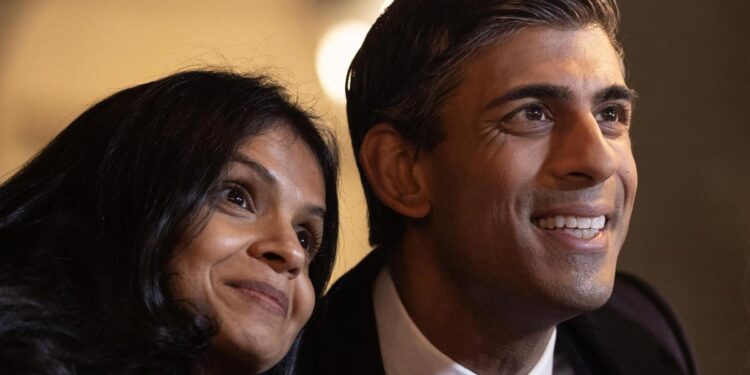Investigation understood to be related to PM’s links to childcare firm in which his wife is an investor
Rishi Sunak faces further questions over his family’s financial interests after a standards investigation was launched into a potential breach of transparency rules relating to his links to a childcare firm in which his wife is an investor.
Opposition parties said the investigation by Daniel Greenberg, parliament’s commissioner for standards, was a sign sleaze had returned to No 10 – and it will be a third propriety investigation into Sunak, who has been fined by police for breaching Covid rules and for not wearing a seatbelt.
While Downing Street has promised to cooperate with the investigation, Sunak plans to rely on a defence that he acted openly over his wife’s stake in Koru Kids by declaring it to a register of ministers’ interests that has not been updated for nearly a year.
But there are question marks over Sunak’s appearance at a select committee hearing where he suggested he did not have anything to declare in relation to a new incentive scheme for childminders to sign up to agencies.
If Sunak is found to have breached MPs’ rules over the declaration, any sanction is likely to be minor and parliamentary sources suggested that should he admit a breach he would probably only be ordered to make a correction.
However, it would be a big political setback for a prime minister who promised to put “integrity and accountability” at the heart of his administration.
The inquiry is likely to centre on Sunak’s appearance before the liaison committee of senior crossbench MPs on 28 March, when the Labour MP Catherine McKinnell quizzed him about a childcare initiative in the recent budget.
Koru Kids, in which Sunak’s wife, Akshata Murty, is a substantial shareholder, was among six private childcare providers set to benefit from a pilot scheme proposed in the budget to incentivise people to become childminders.
When McKinnell asked Sunak whether he had anything to declare in relation to the scheme, he replied: “No, all my disclosures are declared in the normal way.”
It later emerged that bosses from the company attended a Downing Street reception hours after Sunak’s committee appearance.
A subsequent letter to the committee from Sunak said that because he was being asked questions in his capacity as prime minister, the relevant register of interests is that for ministers, and that his interest in Koru Kids had been “rightly declared”.
However, while the separate register of MPs’ interests is updated every fortnight, that for ministers, supposedly published twice a year, has not appeared for nearly 12 months.
It is overseen by the adviser on ministers’ interests, a role that was left empty for six months after the resignation of Christopher Geidt, who stepped down last June amid his unhappiness about Boris Johnson’s role in lockdown-breaching No 10 parties.
Geidt’s replacement, Laurie Magnus, only took over in December and has yet to produce an updated register, despite No 10 saying this is his priority.
A No 10 source said the delay was in order to ensure Sunak had appointed an independent adviser – which his predecessor Liz Truss had refused to do – who could assess the ministerial declarations. “You’ll remember Rishi was the one who put an [adviser] in post in the first place. They and the Cabinet Office have to go through and decide what is in public interest to publish.”
Greenberg must decide whether Sunak’s declaration to a register that is not yet published is sufficient.
The exchange with McKinnell is likely to be crucial – the inquiry said it related to paragraph six of the code of conduct for MPs, which states they “must always be open and frank in declaring any relevant interest in any proceeding of the house or its committees”.
McKinnell is understood to have raised the issue with the commissioner for standards. Sunak does not list his wife’s shareholding on his register of interests as an MP, which MPs are required to update promptly.
Downing Street has argued that this is not necessary, because Sunak cited it on a separate register of ministerial interests.
Angela Rayner, Labour’s deputy leader, said the failure to update the ministers’ register of interests had “left a transparency black hole which is enabling the prime minister and those he has appointed to dodge proper scrutiny of their affairs”.
She said: “If Rishi Sunak has got nothing to hide, he should commit to publishing the register before May’s elections so the public can see for themselves.”
A Downing Street spokesperson said: “We are happy to assist the commissioner to clarify how this has been transparently declared as a ministerial interest.”
One of Greenberg’s main decisions will be whether this interpretation of the interest regulations is correct. It is possible for breaches related to registering an interest to be resolved by so-called rectification, in which the commissioner and the MP concerned agree how it can be properly registered.
While this would spare Sunak potential scrutiny by the standards committee, which oversees the work of the commissioner, it would require No 10 to concede an error.
While failure to register interests can be viewed as a relatively minor infraction, if the commissioner did find Sunak at fault it could be seen as a more serious matter given he did not just omit to mention an interest, but told the liaison committee that he did not have one.
Source: The Guardian


Recent Comments